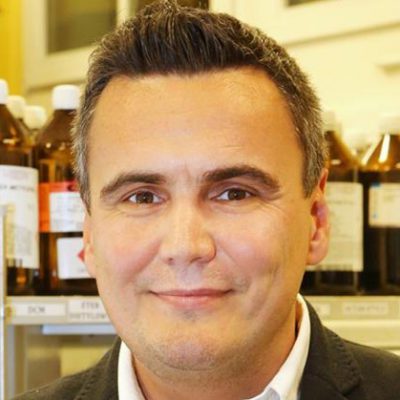
Marcin Drąg
Professor; Department of Chemical Biology and Bioimaging, Faculty of Chemistry, Wroclaw University of Science and Technology, Poland and Tumor Microenvironment and Cancer Immunology Program, Sanford Burnham Prebys Medical Discovery Institute, La Jolla, CA, USA
Biography
Marcin Drąg was born in Świdnica (Poland) in 1975. He earned his M.Sc. degree from Department of Chemistry at University of Wroclaw in 1999. Next, he moved to Department of Chemistry at Wroclaw University of Science and Technology, where he earned his Ph.D. in organic and bioorganic chemistry working on new inhibitors of metallo- ad cysteine proteases under supervision of prof. Pawel Kafarski. His Ph.D. thesis was awarded the best thesis in organic chemistry by Polish Chemical Society and Sigma-Aldrich (2004). In 2003 he was appointed Assistant Professor at Wroclaw University of Science and Technology and shortly after (2004) adjunct position. In years 2005-2008 he conducted postdoctoral research at The Burnham Institute for Medical Research in La Jolla, CA (USA) in prof. Guy Salvesen laboratory. During post-doc he explored protease-driven pathways involved in apoptosis, infection, inflammation, and ubiquitin signaling. After coming back to Poland, in 2011 he received Doctor of Sciences Degree in chemistry (habilitation) for work on new types of combinatorial libraries to investigate proteolytic enzymes. In 2016 he received Professor title in chemistry from President of Poland. In 2019 prof. Drąg has received the 2019 Foundation for Polish Science Prize in the field of chemical and material sciences for developing a new technological platform for obtaining biologically active compounds, in particular proteolytic enzymes inhibitors.
Prof. Drag supervised four Ph.D. students (all cum laude) and 8 post-docs. He is an author of more than 100 publications in per-reviewed scientific journals (f.e.: Nature Reviews Drug Discovery, Nature Chemical Biology, Nature Communications, Nature Protocols, Chemical Reviews, Journal of the American Chemical Society, PNAS, Cell Death & Differentiation). His research interests in chemical biology include the design and synthesis of substrates, inhibitors and activity-based probes to decipher the mechanism of action and the function of proteases in health and disease. Prof. Drąg described several new, versatile technologies useful for rapid determination of proteolytic enzyme substrate specificity. In particular, his laboratory has developed specialization in the application of a large number of unnatural amino acids in combinatorial library structures and the procedure called HyCoSuL (hybrid combinatorial substrate library) that combines natural (proteinogenic) and unnatural (non-proteinogenic) amino acids to enhance targeting affinity of peptides for proteases.

